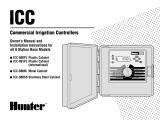The GDC-200 features 10 fully-independent resident programs. With two types of programs to select from, you
can further custom fit your irrigation programs to any landscape.
•
Standard Irrigation Program will activate a station or group of stations with six start times on a daily basis. Each
station will water for the duration specified in hours, minutes and seconds. Percent adjust and maximum number of
simultaneous activate stations per program can be specified in this program.
• Grow-In Irrigation Program will activate a station or group of stations for the length of their runtime. The program
will repeat the cycle after the specified delay time expires and will repeat continuously between the set Start and
End times. Percent adjust and the simultaneous activate stations can be specified in this program.
To utilize these programs automatically or manually, each program must be configured.
Standard Irrigation Program Setting:
Standard Irrigation Program example: Create Program 02 with stations 6–10 running 15 minutes each and stations
15–20 running 10 minutes each with no percent adjustments. Set the start time at 6:30 am with five maximum
simultaneous active station.
1. Press the Scheduled Watering Key . The cursor is initially located at the program selection field. Use the
Input Dial to select the program (P01–P10) you want to create or modify. For this example, select
2.
2. Press the Right Arrow Key to standard to the Percent Adjust field. Normally this setting will be 100%
unless weather or other condition suggest that less or more irrigation is needed. Use the Input Dial
to adjust the setting. For this example, no adjustment is needed.
3. Press the Down Arrow to advance the cursor to the
Hold: field. Use this function to suspend program
operation. Select from
None, Today, 02–30 days or Permanent. For this example, select None.
4. Press the Down Arrow to advance the cursor to the
Type: field. Use the Input Dial to adjust
the setting. For this example, set the Type to
Standard.
5. Press the Down Arrow to advance the cursor to the
Days: field. Use the Input Dial to select
the program activation interval from 01–30 days. Select 01 for everyday, 02 for every other day, 03 for every
third day and so on. The example does not call for a set interval. Leave the
Days: setting to SMTWTFS...
6. Press the Down Arrow to advance the cursor to the
Set: field. Use the Input Dial to select
from any of the preset intervals (All, Alternate days, Weekdays only, Weekends only, None or User set). To
create your own program activation interval, select
Set:. Use the Right Arrow Key to select the day of the
week you want to irrigate and use the Input Dial to activate (X) or deactivate (blank) the selection.
For this example, activate M (monday), W (wednesday) and F (friday) only. MWF of the 1st and 2nd week
should have an
X mark under while the rest are blank.
7. Press the Down Arrow to advance the cursor to the
Start: field. The first entry field will indicate the start
time number. Each program can have a maximum of 24 start times. Use the Input Dial to choose
the start time being created or modified. Press the Right Arrow Key to advance to the time entry field.
Use the Input Dial to select the start time in hours and minutes ( HH:MM). Repeat Step 7 for
additional start times. For this example, set start time
01 to 05:45am.
(Continued to the next page)
Scheduled Watering
1111





















